

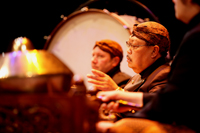
DJOKO WALUJO studied classical Javanese gamelan music from an early age with many of the most highly regarded musicians of Java, including the world renowned K.R.T. Wasitodiningrat (lovingly known as Pak Cokro).
Other master teachers include Raden Lurah Dhamowijoyogo, Raden Ngabehi Prawiro Pangrawit, Raden Mas Handoyo Kusumo, Bapak Harjoswara, Bapak Sunardi Wisnubrata, Bapak Pramono, and Bapak Hadi Sumanto.
Mr. Walujo first earned a law degree from the Gajah Mada University in Yogyakarta, after which he graduated from the Indonesia Arts Institute where he studied music. He soon became a faculty member there and taught Javanese gamelan, from 1975 until coming to America in 1992 with his wife and three children. 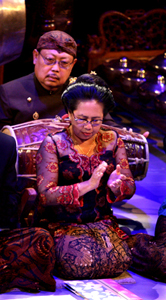 He was hand picked by K.R.T. Wasitodiningrat to be his predecessor as the leader, director, and teacher of the Javanese gamelan at the California Institute of the Arts in Valencia (CalArts).
He was hand picked by K.R.T. Wasitodiningrat to be his predecessor as the leader, director, and teacher of the Javanese gamelan at the California Institute of the Arts in Valencia (CalArts).
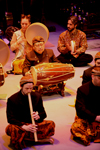
Mr. Walujo has performed throughout Indonesia, Asia, Europe, and the United States. He has composed gamelan music for dance, dance drama, theater, and instrumental music, for which he has received numerous awards from the Indonesian Ministry of Education, the governor of the Special Region of Yogyakarta, the National Radio of Indonesia (RRI), and the governor of Central Java. He currently serves as a faculty member at CalArts, where he continues to teach classical Javanese gamelan and compose music, both classical and contemporary. He is the musical director of the Javanese music and dance group, Kyai Doro Dasih which is based out of CalArts, and which his lovely wife plays and sings in and his two beautiful daughters are featured dancers for.
He has composed gamelan music for dance, dance drama, theater, and instrumental music, for which he has received numerous awards from the Indonesian Ministry of Education, the governor of the Special Region of Yogyakarta, the National Radio of Indonesia (RRI), and the governor of Central Java. He currently serves as a faculty member at CalArts, where he continues to teach classical Javanese gamelan and compose music, both classical and contemporary. He is the musical director of the Javanese music and dance group, Kyai Doro Dasih which is based out of CalArts, and which his two daughters are featured dancers for.
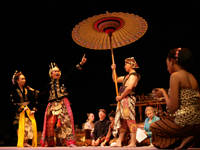
Kyai Doro Dasih is a Javanese music and dance group based out of the California Institute of the Arts in Valencia, California led by Djoko Walujo. This group was established in 1971 by Bob Brown, K.R.T. Wasitodiningrat, his daughter Nanik Wenten, and her husband I Nyoman Wenten. The group was originally known as “Kyai Kumbul”, which means “Honorably Famous”. Traditionally in central Java, gamelan groups are named after the big gong, or gong agen, in the ensemble. The gong agen is given a name according to the quality of sound it makes, the sound of the gamelan in general, or for an historical or philosophical reason. The name of CalArts original gamelan’s gong agen was Kyai Kumbul, thus was the name of the group. In 1995 a new ensemble of instruments replaced the old gamelan. The name of the new gong agen was “Kyai Doro Dasih” (Venerable Dream or Dream Come True). So in 1995, the name of the Javanese music and dance group changed from Kyai Kumbul to Kyai Doro Dasih, which it is today.
K.R.T. Wasitodiningrat, also known as Pak Cokro, was the musical director of the CalArts Javanese gamelan from 1971 until 1992 when he retired. After which he appointed Djoko Walujo to take his place. His daughter, Nanik Wenten, is currently the dance director of the group, and has been since its beginning. She and her husband, I Nyoman Wenten, have served as principle dancers for the group, as well as for the Balinese music and dance group, Burat Wangi, from 1971 until the present.
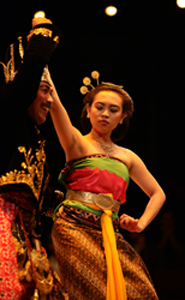
The original gamelan, Kyai Kumbul, was a few instruments short of a complete set, similar to an orchestra missing some cellos, violins, and maybe a timpani drum. As well, many of the instruments came from different gamelan sets, that were retuned to try and fit with Kyai Kumbul. Although this gamelan served its purpose beautifully for many years as a performing ensemble, it never sounded quite right to Pak Cokro’s expert, sensitive ear. Reason being that it is very uncommon to interchange instruments from one gamelan to another, let alone many instruments. This is due to the fact that each and every instrument in a gamelan ensemble is built together at the same time and tuned to match that particular set. Consequently, every gamelan is unique and has a slightly different sound from any other. Thus they are given names to represent their individual characters. Or rather, the big gong of the ensemble is given a name, since that instrument is considered to be the main spirit of the gamelan, which represents the whole set
It was Pak Cokro’s dream for many years, to some day purchase a complete gamelan set with all of its original instruments, for CalArts. Unfortunately he retired before funding came through to support such a venture, which it finally did in 1994. After looking long and hard, Mr. Wenten and Mr. Walujo found a beautifully crafted, high quality Javanese gamelan in a region of Central Java called Solo.
The gamelan maker, who happened to have the same name as Mr. Walujo (Pak Djoko), was commissioned by an individual to build a gamelan set that was to be gifted to the Sultan of Solo, and for some unknown reason, the man changed his mind. So Pak Djoko, the gamelan maker, had this beautiful ensemble sitting in his home collecting dust for several years before it was discovered by Mr. Wenten and Pak Djoko Walujo, the musician.
(“Pak” means father or mister in Indonesian). Upon first meeting the gamelan, Kyai Doro Dasih, Mr. Wenten and Mr. Walujo immediately fell in love with it.
The sound was beautiful, the carvings were unique and intricate, it was made out of the highest quality teak wood, and not only was it a complete set, but it also had a “Bonang Punembu”. This is a special instrument that is not always included in gamelan ensembles, only in certain circumstances.
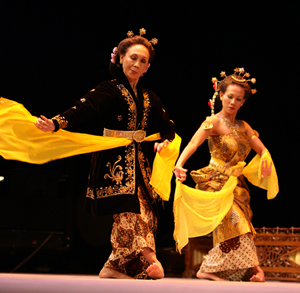 I suppose this would be akin to having a double-necked guitar, as well as a regular guitar in a band. To top it off, the name of the gamelan Kyai Doro Dasih (Dream Come True), was perfectly appropriate.
Finally, after more than twenty years, Pak Cokro’s dream of having a golden sounding ensemble grace his group at CalArts came true. Unfortunately, he would never have the chance to experience it, since he stopped travelling after his retirement, but his essence can be felt vibrant and strong in the music that comes from Kyai Doro Dasih.
I suppose this would be akin to having a double-necked guitar, as well as a regular guitar in a band. To top it off, the name of the gamelan Kyai Doro Dasih (Dream Come True), was perfectly appropriate.
Finally, after more than twenty years, Pak Cokro’s dream of having a golden sounding ensemble grace his group at CalArts came true. Unfortunately, he would never have the chance to experience it, since he stopped travelling after his retirement, but his essence can be felt vibrant and strong in the music that comes from Kyai Doro Dasih.
Today Kyai Doro Dasih is under the talented musical leadership of Djoko Walujo, who was Pak Cokro’s prodigy and number one choice to be his successor; and under the expert dance direction of Pak Cokro’s daughter, Nanik Wenten. The group has been graced with many outstanding visiting guest artists such as Pak Sunarno, Pak Ben, Mas Ciptoning, Eko Supriyanto, and Mas Anang. The musicians and dancers of Kyai Doro Dasih are often featured guests in other gamelan ensembles throughout California, and even Mexico.